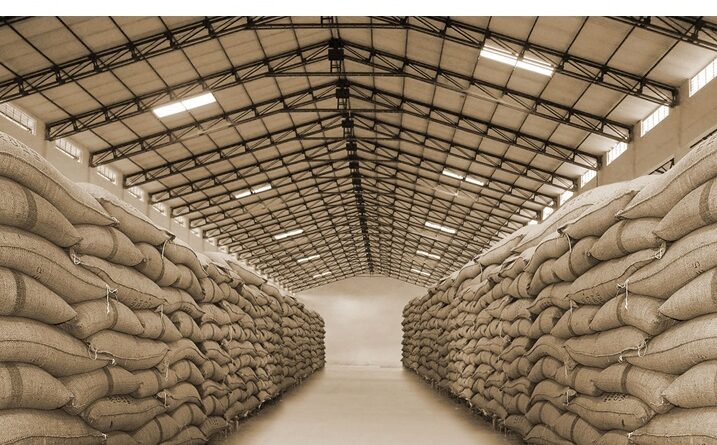Union Cabinet approves World’s Largest Grain Storage Plan in cooperative sector
The Union Cabinet, in its meeting held on May 5, 2023, has approved the ‘World’s Largest Grain Storage Plan in cooperative sector’, to be rolled out as a Pilot Project. The Plan entails creation of various agri infrastructure at Primary Agricultural Credit Societies (PACS) level, including warehouses, custom hiring centre, processing units, Fair Price Shops, etc. by leveraging the ‘whole-of-Government’ approach.
The Plan is being implemented by utilising the approved outlays of the following Government of India (GoI) schemes for creation/ modernization of infrastructure facilities at PACS level:\
1. Ministry of Agriculture and Farmers Welfare:
• Agriculture Infrastructure Fund (AIF),
• Agricultural Marketing Infrastructure Scheme (AMI),
• Mission for Integrated Development of Horticulture (MIDH),
• Sub Mission on Agricultural Mechanization (SMAM)
2. Ministry of Food Processing Industries:
• Pradhan Mantri Formalization of Micro Food Processing Enterprises Scheme (PMFME),
• Pradhan Mantri Kisan Sampada Yojana (PMKSY)
3. Ministry of Consumer Affairs, Food and Public Distribution:
• Allocation of food grains under the National Food Security Act,
• Procurement operations at Minimum Support Price
The Ministry of Cooperation has constituted an Inter-Ministerial Committee (IMC), with Home and Cooperation Minister as its chairman and Ministers and Secretaries of Ministries concerned as its members for smooth and effective implementation of the Plan. The said committee is authorised to modify guidelines/ implementation methodologies of the schemes identified for convergence, as and when need arises, within their approved outlays and prescribed goals for facilitating the Pilot Project of the plan.
The Ministry of Cooperation has also constituted the National Level Coordination Committee (NLCC) under the chairmanship of the Secretary (Ministry of Cooperation) to steer the overall implementation of the plan and reviewing the progress of implementation.
In order to monitor the implementation of the Pilot Project and to ensure seamless integration of the plan with the existing policies/ programmes at State level, States/ Union Territories have also constituted State Cooperative Development Committee (SCDC) at State level and District Cooperative Development Committee (DCDC) in each District under the Chairmanship of Chief Secretary and District Collector respectively. The SCDC/ DCDCs also have members drawn from other departments such as Revenue, Agriculture, Horticulture, and representatives of NABARD, StCB, FCI, WDRA, CWC, SWC. The committees will, inter-alia, examine the storage gap including existing storage facilities, their capacity utilisation, capacity of proposed godowns, viability of the applicant PACS, location of the proposed project, connectivity, logistics, availability of basic infrastructure, market linkages.
National Cooperative Development Corporation (NCDC) with the support of NABARD, NABARD Consultancy Services (NABCONS), Central Warehousing Corporation (CWC), Food Corporation of India (FCI), etc. is implementing the Pilot Project in 24 PACS of 24 different States/ UTs. Construction has started at five PACS, one each in the States of Tripura, Haryana, Tamil Nadu, Uttar Pradesh and Madhya Pradesh. Detailed Project Reports are under preparation for the remaining PACS.
The creation of decentralised storage capacity ranging from 500 MT to 2000 MT at PACS level would reduce food grain wastage by creating sufficient storage capacity, strengthen food security of the country, prevent distress sale of crops and enable farmers to realise better prices for their crops. Since PACS would be operating as a procurement centre as well as Fair Price Shops (FPS), the cost incurred in transportation of food grains to procurement centres and again transporting the stocks back from warehouses to FPS would also be saved.
The estimated cost of the project for each PACS would vary and depend upon various parameters such as storage capacity, requirement for custom hiring centre, processing units, etc. Interest Subvention under the Agriculture Infrastructure Fund would be dovetailed with the subsidies available under the identified schemes for the construction of godowns and other agri-infrastructure at PACS level.
This article has been republished from FNB News

